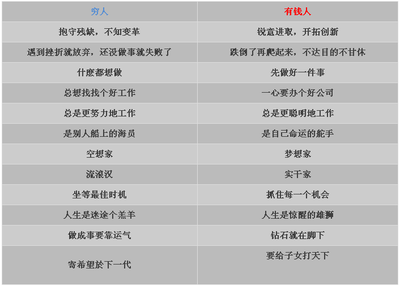Neat People vs. SloppyPeople
整洁人与邋遢人
Suzanne Britt
孙致礼译
I’ve finally figured out the differencebetween neat people and sloppy people. The distinction is, asalways, moral. Neat people are lazier and meaner than sloppypeople.
我终于悟出了整洁人与邋遢人的区别。他们的区别总是表现在德行上。整洁人比邋遢人来得更懒惰、更吝啬。
Sloppy people, you see, are not really sloppy.Their sloppiness is merely the unfortunate conse¬quence of theirextreme moral rectitude. Sloppy people carry in their mind’s eye aheavenly vi¬sion, a precise plan, that is so stupendous, soperfect, it can’t be achieved in this world or thenext.
要知道,邋遢人其实并真的邋遢。他们的邋遢只是过于讲究德行而造成的不良后果。邋遢人心目中有着美妙的想象,有着周密的计划,既宏伟又完满,今生来世都无法实现。
Sloppy people live in Never-Never Land . Somedayis their metier. Someday they are planning to alphabetize all theirbooks and set up home cata¬logues. Someday they will go throughtheir wardrobes and mark certain items for tentative mending andcertain items for passing on to relatives of similar shape andsize. Someday sloppy people will make family scrapbooks into whichthey will put newspaper clippings, postcards, locks of hair, anddried cor¬sage from their senior prom. Someday they will fileeverything on the surface of their desks, including the cashreceipts from coffee purchases at the snack shop. Someday they willsit down and read all the back issues of The NewYorker.
邋遢人生活在理想王国里。他们最善于筹划有朝一日怎么办。有朝一日,他们要把自己的书全都按照字母顺序编排好,建立一个家庭图书目录。有朝一日,他们要把自己的衣服全都翻个遍,有的标明要实施能不能修补一下,有的要送给体型身材差不多的亲戚。有朝一日,邋遢人要制作家庭剪贴簿,把剪报、明信片、头发以及大学四年级班级舞会上用过的枯萎的装饰花放在里面。有朝一日,他们要把办公桌上的所有东西,包括在快餐店买咖啡的现金收据,全部归档整理好。有朝一日,他们要坐下来阅读所有过期的《纽约人》。
For all these noble reasons and more, sloppypeople never get neat. They aim too high and wide. They saveeverything, planning someday to file, or¬der, and straighten outthe world. But while these ambitious plans take clearer and clearershape in their heads-, the books spill from the shelves onto thefloor, the clothes pile up in the hamper and clos¬et, the familymementos accumulate in every draw¬er, the surface of the desk isburied under mounds of paper and the unread magazines threaten toreach the ceiling.
由于这些以及其他雄心勃勃的理由,邋遢人从来整洁不起来。他们把目标定得太高太远,什么东西都要保留下来,计划有朝一日再整理、再归档,把一切搞得井井有条。然而,就在这些宏伟的计划在心里渐渐成形的时候,书从书架上散落到地上,衣篮和衣柜里堆满了衣服,个个抽屉里都放满了纪念品,桌面上摆满了一摞摞的材料,没读过的杂志都快顶到天花板了。
Sloppy people can’t bear to part with anything.They give loving attention to every detail. When sloppy people saythey’re going to tackle the surface of the desk, they really meanit. Not a paper -will go unturned; not a rubber -band will gounboxed. Four hours or two weeks into the excavation, the desklooks exactly the same, primarily because the sloppy person ismeticulously creating new piles of papers with new headings andscrupulously stopping to read all the old book catalog before hethrows them away. A neat person would just bulldoze thedesk.
邋遢人什么东西都不舍得丢掉,什么小东西都当成宝贝。当邋遢人说要清理桌面时,他们还真不是说着玩的。每一张纸片都要翻个个儿,每一根橡皮筋都要装到盒子里。经过四小或两星期的大清理,桌面上还跟先前一模一样,主要因为邋遢人会一丝不苟地立起新的名目,建起新的文件堆,还要把所有的旧书目仔仔细细地察看一番,才肯最终扔掉。整洁人则会把桌子清除得一干二净。
Neat people are bums and clods at heart. Theyhave cavalier attitudes toward possessions, including familyheirlooms. Everything is just another dust-catcher to them. Ifanything collects dust, it’s got to go and that’s that. Neat peoplewill toy with the idea of throwing the children out of the housejust to cut down on the clutter.
整洁人其实都是些懒汉和笨蛋。他们对自己的东西漫不经心,就是传家宝也毫不在意。在他们看来,任何东西都会吸引灰尘、什么东西一染上灰尘就得处理掉,没有什么好说的。为了减少家里的凌乱,整洁人还捉摸想把孩子扔出去。
Neat people don’t care about process. They likeresults. What they want to do is get the whole thing over with sothey can sit down and watch the rasslin on TV. Neat people operateon two unvary¬ing principles: Never handle any item twice, andthrow everything away.
整洁人并不在乎过程,而是喜欢结果。他们只想把什么都了结了,好坐下来打开电视看摔跤。整洁人有两条一定不易的行为准则:什么东西都不做二次处理,统统都要扔掉。
The only thing messy in a neat person’s house isthe trash can. The minute something comes to a neat person’ s hand,he will look at it, try to decide if it has immediate use and,finding none, throw it in the trash.
整洁人家里唯一凌乱的就是垃圾箱。整洁人一拿到一样东西,就要打量一番,看看是否能马上派上用场,如果马上派不上用场,就扔进垃圾箱里。
Neat people are especially vicious with mail.They never go through their mail unless they are standing directlyover a trash can. If the trash can is beside the mailbox, evenbetter. All ads, cata¬logs, pleas for charitable contributions,church bul¬letins and money-saving coupons go straight into thetrash can without being opened. All letters from home, postcardsfrom Europe, bills and paychecks are opened, immediately respondedto, then dropped in the trash can. Neat people keep their receiptson¬ly for tax purposes. That’s it. No sentimental salvaging ofbirthday cards or the last letter a dying rel¬ative ever wrote.Into the trash it goes.
整洁人对信件特别不留情。他们每次看信必定要站在垃圾箱跟前。如果垃圾箱就在信箱旁边,那岂不是更好。所有的广告、目录、恳求慈善捐款、教堂公告、购物优惠券,也不拆封就投进了垃圾箱。所有的家信、欧洲来的明信片。所有的帐单和薪金支票,则要打开,马上回复,然后扔进垃圾箱。整洁人只是为了方便缴税,才保存收据的。仅此而已。他们决不会感情用事,保留生日卡或哪位生命垂危的亲戚写来的最后一封信。这些全要扔进垃圾箱。
Neat people place neatness above everything, eveneconomics. They are incredibly wasteful. Neat people throw awayseveral toys every time they walk through the den. I knew a neatperson once who threw away a perfectly good dish drainer be¬causeit had mold on it. The drainer was too much trouble to wash. Andneat people sell their furniture when they move. They will sell aLa-Z-Boy recliner while you are reclining in it.
整洁人把整洁看得高于一切,甚至都不考虑经济因素。他们浪费起来真令人难以置信,每次打娱乐室走过时,都要扔掉几件玩具。我曾认识一个整洁人。他扔掉了一只非常好的餐具滤干器,因为那玩意儿发霉了,洗起来太费劲儿。整洁人一搬家,就要卖家具。你还躺在一把懒汉躺椅上,他们就把躺椅给卖掉了。
Neat people are no good to borrow from. Neatpeople buy everything in expensive little single por¬tions. Theyget their flour and sugar in two-pound bags. They wouldn’t considerclipping a coupon, saving a leftover, reusing plastic non-dairywhipped cream containers or rinsing off tin foil and draping itover the unmoldy dish drainer. You can never bor¬row a neat persons newspaper to see what’s playing at the movies. Neat people havethe paper all wadded up and in the trash by 7:05 a.m.
整洁人的东西可不要去借。他们买什么东西都要价钱很贵的单份小包装,买面粉和食糖要两磅一袋的。他们从不考虑剪下一张购物优惠券,保留一点剩余物,重复使用非乳制掼奶油塑料盒,或是把锡纸冲洗干净,打在没有发霉的餐具滤干器上。你想向整洁人借张报纸看看电影院在放映什么电影,那是永远办不到的。早晨七点零五分,整洁人就把报纸揉作一团,扔进了垃圾箱。
Neat people cut a clean swath through theor¬ganic as well as the inorganic world. People, ani¬mals, andthings are all one to them. They are so insensitive. After theyhave finished with the pantry, the medicine cabinet, and the attic,they will throw out the red geranium (too many leaves) sell the dog(too many fleas), and send the children off to boarding school (toomany scuffmarks on the hardwood floors).
整洁人不管你是无生物,还是有生物,全都一扫而光。人、动物、东西,对他们来说都是一回事。他们太麻木不仁了。他们清理完食品室、药柜和阁楼之后,就会扔掉天竺葵(嫌叶子太多),卖掉狗(嫌跳蚤太多),他把孩子打发到寄宿学校(嫌他们给硬木地板留下太多的瘢痕)。
《用一生注解友谊》陈国华英译文赏析作者:一鸣《用一生注解友谊》英译
毛志成
在一所美术学院, 三十多年前有两位教作品欣赏的中年教师。一位教西洋画欣赏课, 姓吕,本人修饰得也很有“西方风度”,整日里西装笔挺,皮鞋锃亮,头发也总是油光闪闪。另一位是教国画欣赏课的,姓唐,本人的风度也颇国粹,穿的是长衫,布鞋,头发不多,而胡子颇长。
学生背后戏称两个人为“西洋吕”、“国粹唐”。
两个人都对自己的专攻很痴情,很虔诚,因之对“异学”就格外地不能容忍,拒绝同化,于是,两个人的“互相攻击”现象也就从不断。
例如西洋吕在讲课强调西洋画的造型真实度,随后就将自己给妻子画的一张油画肖像挂黑板上。他的夫人(一位西方式的大美人),学生都见过;再看这张画,简直和真人一样,当即就爆发出一阵喝彩声。西洋吕很得意,下面的话就开始带刺儿:“连造型真实都达不到的艺术是否可以称为艺术,总是让人怀疑。”下一节课,国粹唐将自己用国画手法画的自己的老父(一位老年美髯公)挂在黑板上,学生又感觉到了另一种特殊神韵,又是一片喝彩声。下面,国粹吕的话也开始带刺儿:“专追求造型真实,不追求真实以上的神韵,不叫艺术。学这一套,不如去学照相!”
但也就是在这种“对攻”而谁也不作妥协的过程中,双方都发现了对方的可贵人格——对本职本业的忠诚,不媚俗。西洋吕已是教授,国粹唐没有职称。西洋吕在做评委的时候,力排众议,力主将国粹唐定为教授。别人不解,提及了他们往日的不和,西洋吕说:“我同意的是定他为国画教授,并没有说他可以做西洋画教授!”
学校分房,此时两个人还都住在学校一座废园中的平房内,作为分房委员会副主任的国粹唐,断然把他也有资格分到的一套楼房分给西洋吕,理由是:“搞西洋画的,生活环境也应该洋一点嘛!我搞国画,面对竹篱茅舍才有创作冲动嘛!”
这种时候,他们并没有意识到他们的友谊已经形成,并可以接受重大考验。
Friendship for AllTime
国华 译
Overthirty years ago, there were two middle-aged lecturers teaching artappreciation in a fine arts academy. One of them, whose surname wasLu, taught appreciation of Western art and had a Western air abouthim—always wearing a well-pressed Western suit and shiny leathershoes, and keeping his hair so well oiled that it sparkled. Theother one, whose surname was Tang, taught appreciation of Chineseart, and was very Chinese in appearance—wearing a traditionalChinese gown and cotton slippers, with thinning hair and a longishbeard.
Behindtheir backs, the students dubbed them “Western Lu” and “ChineseTang”, respectively.
As eachloved his own field and was totally devoted to it, they were unableto tolerate the other side’s “alien learning” and absolutelyrefused to accommodate each other. Because of this, the two of themwere constantly attacking one another.
Forinstance, while lecturing, Western Lu, who attached greatimportance to the lifelike quality of Western art, hung on theblackboard an oil portrait of his wife which he had painted. Thestudents had all seen his wife—a Western-style beauty. Upon seeingthe portrait, which was a good likeness of the sitter, the studentsbroke into cheers and applause. Feeling pleased with himself,Western Lu began to comment sarcastically, “I always doubt whethera work of art that hasn’t even achieved formal resemblance to thesubject deserves to be called art.” In the next class, Chinese Tangput up on the blackboard a portrait of his father (an old man witha long beautiful beard), which he had painted with the techniquesof traditional Chinese painting. The students experienced adifferent kind of unique artistic charm, and again broke into loudcheers and applause. Chinese Tang’s remarks also turned sarcastic:“Pursuing merely formal resemblance without conveying the spirit ofthe subject is not art. I would rather learn photography than thatkind of stuff!”
Yet itwas in the process of these uncompromising mutual attacks that eachdiscovered the admirable qualities of the other—a refined artistictaste and total devotion to his art and profession. When Western Luwas already a professor, Chinese Tang still held no professionaltitle. As a member of the board that conferred professional titles,Western Lu strongly recommended Chinese Tang for a professorshipover the objections of other. The others were puzzled and mentionedtheir past conflicts. Western Lu explained, “I’m in favor of givinghim the professorship of Chinese art. I didn’t say he was qualifiedto be a professor of Western art!”
When thetime came to reallocate lodgings for the staff members, Western Luand Chinese Tang still lived in a bungalow in a dilapidated part ofthe academy. As vice-chair of the Housing Committee, Chinese Tangallocated an apartment, for which he was equally eligible, toWestern Lu without giving it a second thought, his reason beingthat “For someone studying Western art, his living conditionsshould also be a little more westernized, shouldn’t they? My fieldis Chinese art, and I wouldn’t have any creative impulse unlessthere were a thatched cottage with a bamboo fence in front ofme.”
At thattime they didn’t realize that they had formed a friendship thatwould stand the test of life and death.
 爱华网
爱华网



